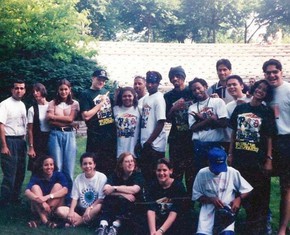The views expressed in our content reflect individual perspectives and do not represent the authoritative views of the Baha'i Faith.
Like anything mechanical, democracy constantly needs repair. When the mechanism gets corroded and worn, the people and their elected leaders have to fix it.
Although the mechanisms of democracy can differ according to time and place, it’s good to keep in mind the general aims and principles that democracy itself seeks to serve, so that repairs—and improvements—can be made according to a larger vision.
Consider, for example, how the development of democracy over hundreds of years has inched forward, mostly in fits and starts, towards greater inclusivity and egalitarianism. We’ve moved away from systems that excluded women, non-landowners, people of color, the illiterate, and various once-excluded groups such as Catholics, Jews and Quakers. These improvements took place over a long span of time; some were ongoing until quite recently. Women, for instance, were excluded from the democratic process in several Western countries until well into the 20th Century.
Much progress remains to be accomplished in the quality of our democratic systems. A glance at The Democracy Index reveals that many countries are listed as “flawed democracies”, often due to problems in their functioning, levels of participation and restriction of civil liberties. As a contrast to those flawed democracies, the top ten democracy scorers—Norway, Iceland, Sweden, New Zealand, Denmark, Ireland, Canada, Australia, Finland, Switzerland, and the Netherlands—all have free and fair elections, a free press and high levels of citizen engagement in governance.
Democracy ultimately serves human happiness, individually and collectively. In fact, the ranking of countries in the World Happiness Report bears an uncanny resemblance to the Democracy Index ranking. On page 20 of the current report you’ll find the leading ten happiest countries—and the list is virtually identical to the Democracy Index, although the ordering changes a bit.
No matter where a country stands on either list, there’s always room for improvement. It pays to look at best practices and either adopt or adapt them.
Much can be learned by examining the principles underlying the Baha’i system of democracy, which has always had happiness at its heart. This only makes sense, given that the general aim of the Baha’i Faith strives for the building of a unified, just and peaceful world—the progress and spiritualization of civilization:
Consider what a vast difference exists between modern democracy and the old forms of despotism. Under an autocratic government the opinions of men are not free, and development is stifled, whereas in democracy, because thought and speech are not restricted, the greatest progress is witnessed. – Abdu’l-Baha, The Promulgation of Universal Peace, p. 198.
The democratic Baha’i principles include good will, working toward consensus, frankness balanced with kindness, the impartial seeking of best solutions and service to the common good. The democratic Baha’i system—which has no clergy and no arbitrary individual authority—also does away with partisanship, campaigning, lobbying, and adversarial political practices.
This kinder, gentler set of standards has the advantage of drawing forward people who prefer to avoid contentiousness and wrangling, but who nevertheless are interested in service to their communities.
In the words of Abdu’l-Baha, who travelled throughout Europe and North America in the early 20th century:
Parliamentary procedure should have for its object the attainment of the light of truth upon questions presented and not furnish a battleground for opposition and self-opinion. Antagonism and contradiction are unfortunate and always destructive to truth. – The Promulgation of Universal Peace, p. 73.
The global Baha’i community uses a consultative form of democracy to elect its administrators at the local, regional, national and international levels. Individuals are elected and expected to work together following a set of principles that seeks to maintain peace and unity, diversity of opinion, creativity and orderliness. The consultative process is straightforward and worth the occasionally steep learning curve:
He who expresses an opinion should not voice it as correct and right but set it forth as a contribution to the consensus of opinion, for the light of reality becomes apparent when two opinions coincide. A spark is produced when flint and steel come together. Man should weigh his opinions with the utmost serenity, calmness and composure. Before expressing his own views, he should carefully consider the views already advanced by others. If he finds that a previously expressed opinion is more true and worthy, he should accept it immediately and not willfully hold to an opinion of his own. – Ibid., p. 72.
The forms and structures of democracy will no doubt continue to evolve to reflect society’s changing needs and values—but there will always be a need to examine our guiding principles and goals, and to be bold in our pursuit of happiness.
















Comments
Sign in or create an account
Continue with Googleor